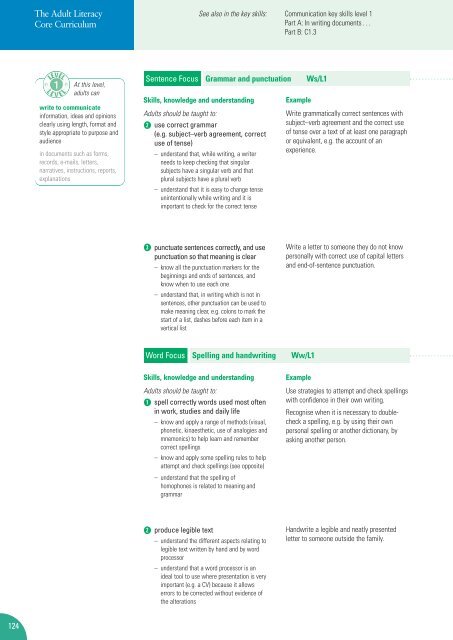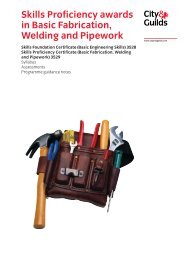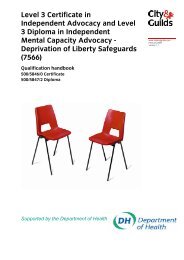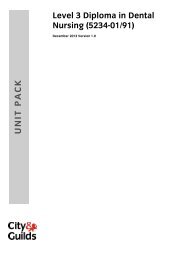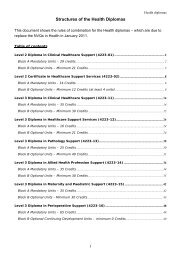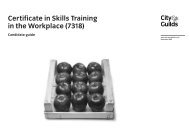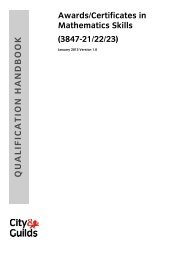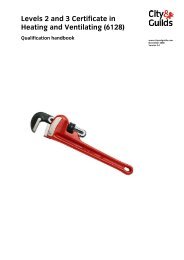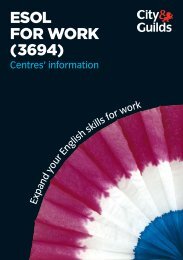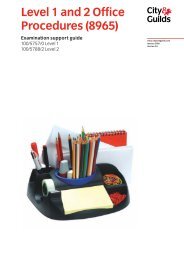Adult Literacy Core Curriculum - Nationally developed Skills for Life ...
Adult Literacy Core Curriculum - Nationally developed Skills for Life ...
Adult Literacy Core Curriculum - Nationally developed Skills for Life ...
You also want an ePaper? Increase the reach of your titles
YUMPU automatically turns print PDFs into web optimized ePapers that Google loves.
124<br />
The <strong>Adult</strong> <strong>Literacy</strong><br />
<strong>Core</strong> <strong>Curriculum</strong><br />
At this level,<br />
adults can<br />
write to communicate<br />
in<strong>for</strong>mation, ideas and opinions<br />
clearly using length, <strong>for</strong>mat and<br />
style appropriate to purpose and<br />
audience<br />
in documents such as <strong>for</strong>ms,<br />
records, e-mails, letters,<br />
narratives, instructions, reports,<br />
explanations<br />
Sentence Focus Grammar and punctuation Ws/L1<br />
<strong>Skills</strong>, knowledge and understanding<br />
<strong>Adult</strong>s should be taught to:<br />
2 use correct grammar<br />
(e.g. subject–verb agreement, correct<br />
use of tense)<br />
– understand that, while writing, a writer<br />
needs to keep checking that singular<br />
subjects have a singular verb and that<br />
plural subjects have a plural verb<br />
– understand that it is easy to change tense<br />
unintentionally while writing and it is<br />
important to check <strong>for</strong> the correct tense<br />
3<br />
punctuate sentences correctly, and use<br />
punctuation so that meaning is clear<br />
– know all the punctuation markers <strong>for</strong> the<br />
beginnings and ends of sentences, and<br />
know when to use each one<br />
– understand that, in writing which is not in<br />
sentences, other punctuation can be used to<br />
make meaning clear, e.g. colons to mark the<br />
start of a list, dashes be<strong>for</strong>e each item in a<br />
vertical list<br />
Example<br />
Word Focus Spelling and handwriting Ww/L1<br />
<strong>Skills</strong>, knowledge and understanding<br />
<strong>Adult</strong>s should be taught to:<br />
1 spell correctly words used most often<br />
in work, studies and daily life<br />
– know and apply a range of methods (visual,<br />
phonetic, kinaesthetic, use of analogies and<br />
mnemonics) to help learn and remember<br />
correct spellings<br />
– know and apply some spelling rules to help<br />
attempt and check spellings (see opposite)<br />
– understand that the spelling of<br />
homophones is related to meaning and<br />
grammar<br />
2<br />
See also in the key skills: Communication key skills level 1<br />
Part A: In writing documents . . .<br />
Part B: C1.3<br />
produce legible text<br />
– understand the different aspects relating to<br />
legible text written by hand and by word<br />
processor<br />
– understand that a word processor is an<br />
ideal tool to use where presentation is very<br />
important (e.g. a CV) because it allows<br />
errors to be corrected without evidence of<br />
the alterations<br />
Write grammatically correct sentences with<br />
subject–verb agreement and the correct use<br />
of tense over a text of at least one paragraph<br />
or equivalent, e.g. the account of an<br />
experience.<br />
Write a letter to someone they do not know<br />
personally with correct use of capital letters<br />
and end-of-sentence punctuation.<br />
Example<br />
Use strategies to attempt and check spellings<br />
with confidence in their own writing.<br />
Recognise when it is necessary to doublecheck<br />
a spelling, e.g. by using their own<br />
personal spelling or another dictionary, by<br />
asking another person.<br />
Handwrite a legible and neatly presented<br />
letter to someone outside the family.


